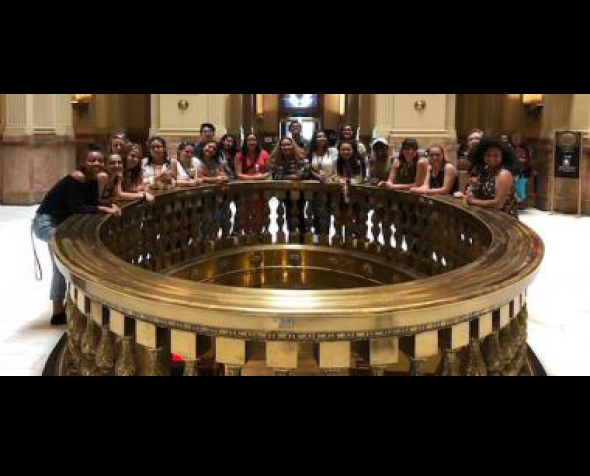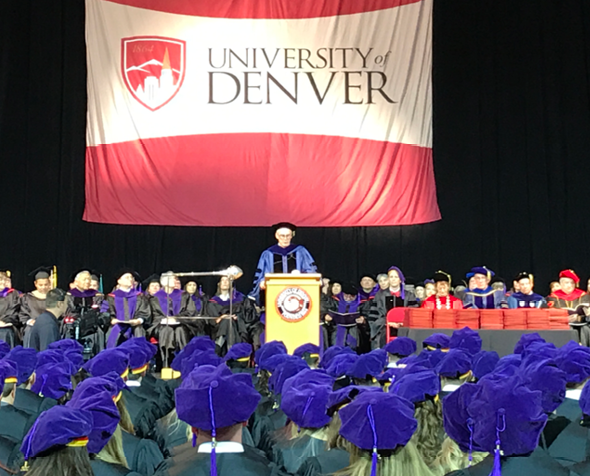Students and Professionals Come Together to Talk Law and Life
January is National Mentoring Month and there is no better example of mentoring at its finest than the Professional Mentoring Program (PMP) at the University of Denver Sturm College of Law.
Since 2005, the PMP has been a national leader in offering guidance on legal skills, career opportunities and much more to law students. But, its strength lies not only in the practical skills provided but also the lifelong, personal connections it fosters and the dedicated mentors who donate their time.
The PMP is the brainchild of Director Mike Massey. While teaching in the Lawyering Process (LP) program he witnessed a great need for student guidance.
“I discovered that most of my first-year students had little first-hand knowledge of what lawyers did. Most of them had never met a lawyer and few of them had lawyers in the family,” Massey relates.
With the help of lawyer friends from his network, he launched the PMP to connect law students with lawyers. The program started modestly, including only students in Massey’s LP class, but it soon started to bloom as more students learned the value of professional connections.
Massey, along with then director of the LP program, Professor K.K. DuVivier, decided to expand the PMP, and by the 2007–08 academic year, the program offered a mentor to each first-year student at Denver Law, and has expanded to offer services to all J.D. and graduate students. Today, under the guidance of Massey and Andrew Frohardt, senior Professional Mentoring Program coordinator, nearly 1,100 people participate, including more than 600 students and 400 mentors.
Investing in the Future of the Profession
Doug Brown, retired chief attorney for the Colorado state legislature and member of the Mentor Advisory Board, has been volunteering his time to the PMP since the beginning.
“I always felt like having someone who had experience and had been in the law business, giving a young person a chance to have a relationship, exchange thoughts and just get to know each other, would be a tremendous benefit,” said Brown.
The program is designed to match students with mentors in their legal field of interest who can guide them through school and get them started in the profession.
“It’s just really practical help for the law students who in most cases don’t know what they are getting into,” said Brown, who adds that he runs the gamut of giving first-year students advice on how to handle the anxiety of law school to providing connections and networking opportunities for graduating mentees.
Mentors also really focus on another critical aspect of the profession: professional responsibility. Mentees are taught the foundation of what professional responsibility, legal ethics and proper behavior in the practice of law are all about. These reasons are also why many mentors donate their time.
“The whole business of professional responsibility is critical to any lawyers practice. It provides them grounding to help them grow in the profession. I really believe in the program, and in the professional responsibility of helping mentees out,” said Brown.
Bridging the Gap
Alumna and mentor, Mary Jo Gross (JD’79), knows first-hand how difficult it can be to be a law student without professional guidance. As a night student, she didn’t have a strong support system to help her along her legal journey.
“When I was in law school in the 70s in night school, I didn’t really have anyone who took much interest in what I was doing. I didn’t really have a support mechanism,” she related, adding “I enjoy mentoring the part-time students because I can relate to that experience.”
Gross is always looking for mentees, meeting them through the program, through recommendations, and through events. She opens her heart to her mentees and often opens her home to them, as well, inviting past and current mentees and others to join her for Thanksgiving. She also ensures that students she works with, past and present, have a place at her table at the annual DU Law Stars event.
Gross’ mentoring philosophy is simple.
“I just want them to know that I am here. If they need help with a project, or if they need me to listen to something. And I like to make sure that they are well fed.”
Building Relationships
While the PMP is designed to take eight hours of a mentor-mentee pair’s time each academic year, those hours are just a drop in the bucket of what is actually offered. That’s because mentoring is not only about ushering in a new generation of lawyers into the profession; It’s also about developing connections and creating lifelong bonds.
Han DePorter, 1L, said that mentor, attorney and adjunct professor, Joe Goldhammer, has provided valuable guidance through his experience in education and labor law. But, importantly, their work together has yielded much more.
“Joe and I spent more time together than the mentorship program required, so in doing so, we got to know each fairly well,” related DePorter. “We talked about our shared love for hiking, so he invited me for a day of hiking and elk sightseeing in Rocky Mountain National Park. I don’t think we talked about anything law related that entire trip. Although this is a professional mentorship program, there are so many things that make up an individual’s identity besides being a lawyer, so I think it is important to see that as well.”
Goldhammer, who is not only involved in the program but also has an open door to former mentees, as well as students who have taken his courses at Denver Law, really takes on a holistic philosophy of mentoring the whole person.
“The personal relationships that you nurture and cultivate are part of our education. I wanted to make sure that Han felt at home not only with me but also with my family and knows to call on us whenever needed. Han’s very bright, a very good student and will make a fabulous lawyer,” Goldhammer said.
Brown has similar philosophy and often takes his mentees to Rockies games or Broncos games to create a connection outside of law. He said more guidance is often given over coffee or in a bleacher seat than any conference table.
“Telling your personal story allows mentees to relate to you as a person, not necessarily just a lawyer or as a resource. The connection outside of law, going to baseball games and football games, really creates a relationship. It’s those incidental things that you say that often turn out to be the most value to students,” he relates.
Getting Involved
The PMP doesn’t just benefit the students; it’s a positive experience for the mentors, as well.
“Mentoring, particularly at Denver Law, has been one of the most rewarding experiences of retirement. It gives you connection with young people, and it’s a growth experience,” Brown said.
Goldhammer takes pride in knowing that volunteering his time has spurred his mentees to do the same. In fact, around 50 percent of PMP mentors are Denver Law alumni.
“There is a culture of helping younger people. It’s part of what being a lawyer is.”
Denver Law’s PMP is always accepting new mentors to help shape the future of the legal professional. To learn more about the program, visit www.law.du.edu/professional-mentoring-program.





